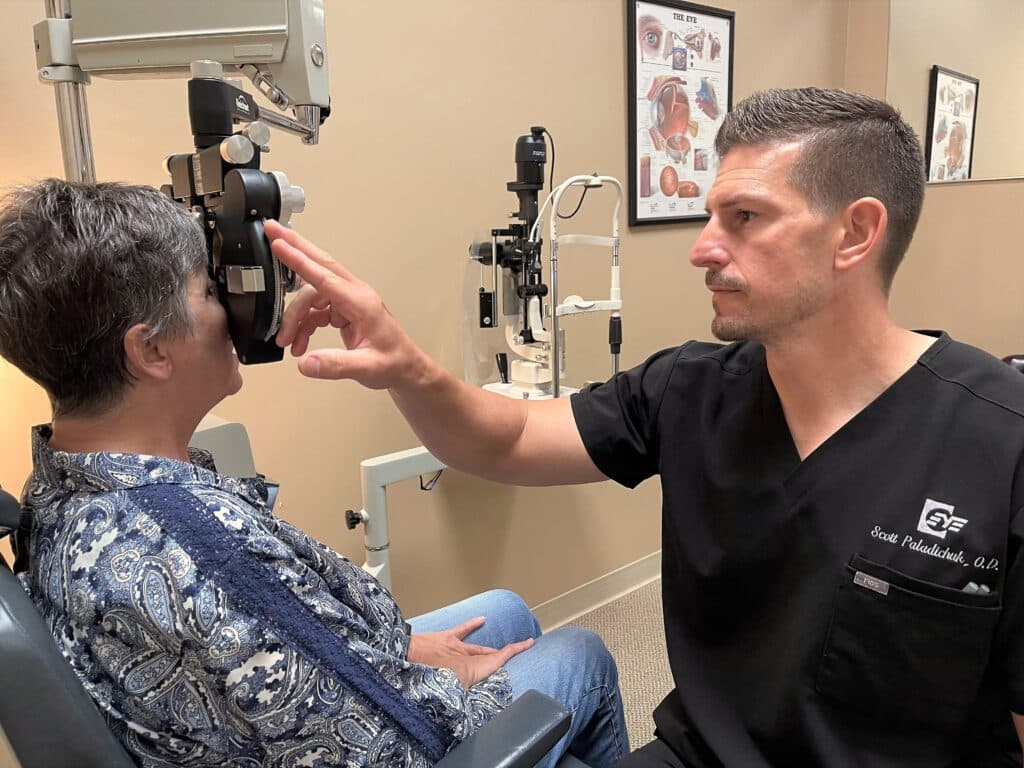November is Diabetic Eye Disease Awareness Month and here’s what those with diabetes need to know to lower their risk of eye disease.
Diabetes doesn’t just affect the heart and blood vessels: This chronic disease can profoundly impact every other part of the body—and especially the eyes.
Consistently high blood sugar damages blood vessels, particularly the tiny arteries that serve the retina. This can trigger diseases that impair vision or even cause blindness.

“The most common eye diseases suffered by diabetics are diabetic retinopathy (damage to the retina), macular edema (swelling in the tissue responsible for central vision), cataracts, and glaucoma,” says Dr. Scott Paladichuk, a Therapeutic Certified Optometrist with Hattiesburg Eye Clinic specializing in disease diagnosis and management. “These represent the greatest risks for diabetics to their eyesight.”
Although retinopathy can have other causes other than diabetes, it occurs most often in diabetics. Likewise, even though cataracts and glaucoma are common in all populations (especially those over 65), diabetics are at three times the risk for contracting them.
But although the risks are high, visual impairment isn’t inevitable. Here are some guidelines Dr. Paladichuk recommends you follow if you have diabetes to protect your eyesight.
Manage Your Diabetes. Your chances of developing diabetic retinopathy or other diseases are sky high if your diabetes is out of control. On the flip side, controlling your condition goes a long way toward protecting your eyesight.
“When your glucose levels are under control, the blood vessels in the retina can stay healthier for longer, and are less prone to leakage or blockage,” says Dr. Paladichuk. “Even if you do develop retinopathy, good glucose management can dramatically slow the progression toward sight-threatening stages.”
Controlling diabetes requires discipline and a comprehensive plan. That plan should include medication, diet, cholesterol management, and exercise to keep blood glucose within normal ranges. In particular, Dr. Paladichuk says exercise is one of the most effective non-drug tools for controlling diabetes, as well as improving metabolic and vascular health overall.
Don’t Smoke. Using tobacco products if you’re a diabetic is like throwing gasoline on a fire—smoking makes it nearly impossible to keep your diabetes under control.
“Smoking damages nearly every part of the vascular system,” says Dr. Paladichuk. “And since diabetes already puts stress on small blood vessels—especially those in the retina—smoking multiplies that risk.”
If you smoke, getting on board with a cessation program and quitting can improve your diabetes management and overall health.
Get Regular Eye Exams. Regular eye exams are a must for anyone getting older to stay ahead of developing conditions, but especially those with diabetes. And although generally anyone over age 40 should be getting an annual eye exam, Dr. Paladichuk says those with diabetes should begin these regular checkups as soon as they’re diagnosed.
With most eye diseases, the key to effective treatment is discovering the condition as early as possible. The best way to get ahead of it is through regular eye exams. Early detection and timely treatment could prevent vision loss in up to 90% of diabetic patients.
Although the risks are high, impaired vision isn’t necessarily a diabetic’s future destiny. Following these guidelines, you can greatly increase your chances of preserving your vision for many years to come.
To learn more about Hattiesburg Eye Clinic’s comprehensive vision care, be sure to visit our website. To find out how Hattiesburg Eye Clinic can improve your vision health, call 601-268-5910 (or toll-free 800-624-8254) or schedule a consultation with us at www.hattiesburgeyeclinic.com/contact-us/
